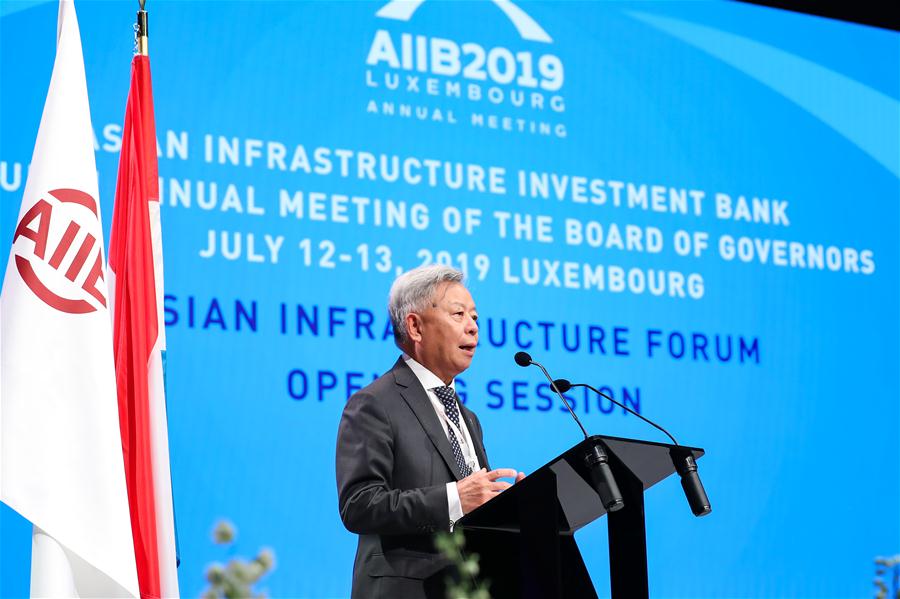
Jin Liqun, president of Asian Infrastructure Investment Bank (AIIB), makes a speech at the Asian Infrastructure Forum during the fourth annual meeting of the AIIB in Luxembourg, July 13, 2019. [Photo/Xinhua]
Jin Liqun, president of the Asian Infrastructure Investment Bank, said he wants AIIB to become the bank that connects Asia to the world as it marked a total of 100 approved memberships during the past weekend.
The AIIB Board of Governors approved on Saturday the applications of three African countries — Benin, Djibouti and Rwanda — at the bank's annual meeting in Luxembourg. This would bring the total number of AIIB members to 100, including 70 whose memberships have been ratified by their parliaments.
"AIIB members collectively account for 78 percent of the world's population and 63 percent of global GDP. With the backing of all of our members, we are building a lean, clean and green institution that can help to support their sustainable development," Jin said.
Finance Minister Liu Kun said at the meeting on Saturday that he hopes the AIIB will give play to its own advantage as a multilateral development bank to link its strategy with the development blueprints of its members, the Belt and Road Initiative and the Connecting Europe and Asia Strategy of the European Union.
"China, an AIIB shareholder and a country that hosts AIIB's head office, will continue to support the bank's development," Liu said.
Liu suggested that AIIB come up with an overall strategy based on previous operating experiences to guide its further development, its features, new trends of global growth and the diversified requirements of members. Uzziel Ndagijimana, Rwanda's minister of finance and economic planning, called AIIB "a great bank".
"We are happy to join as the 100th member. We are looking forward to not only having fruitful cooperation with the bank, but also with the member countries to promote infrastructure and promote trade and investment between Asia and Africa," he said on Saturday.
The three new prospective nonregional members will officially join AIIB once they complete the required domestic processes and deposit the first capital installment with the bank.
At the annual meeting, the first held outside of Asia, Luxembourg Finance Minister Pierre Gramegna praised AIIB as "arguably the most modern and international financial institution in the world".
"The bank has emerged as a beacon of multilateralism while surpassing expectations of growth," he said. Luxembourg was the first European nation to join the AIIB, as the United States government was trying to lobby European countries not to join the multilateral development bank initiated by China.
Gramegna said membership of European members has been beneficial for both European and Asian countries, especially given the AIIB's motto of being lean, clean and green. "Looking at the results of the past three and a half years, we can all be very pleased with what has been achieved, both in terms of financial operations and the quality of the work that has been done," he said.
Since January 2016, the AIIB has provided $8.5 billion in loans to 45 projects in 18 member countries, many in renewable energy and green infrastructure. It also has received the highest credit ratings from the world's three biggest rating agencies — Standard & Poor's, Moody's and Fitch Group. In May, the AIIB's five-year dollar bonds drew investors from dozens of countries.
Jin said the bank has a good working relationship with other multilateral development banks such as the World Bank, Asian Development Bank and European Bank for Reconstruction and Development. "We set the bar at the par with other multilateral development institutions and other institutions, so we can work together," he said. "We are happy to see that we are recognized as such a bank."
But he also said there is no room for complacency. "We are the new kid on the block, and we have a lot to learn from our sister institutions," he said.
Jin said people should take a realistic view, that it takes time to help developing countries in their transition from high-carbon to low-carbon to zero-carbon economies. "So it's really a very tough job. And we are doing our very best," he said in response to criticism that AIIB is not doing enough.
The two-day annual meeting had some 30 sessions, including on climate change, debt sustainability, digital connectivity and private equity for sustainability infrastructure.
The bank's next annual meeting will be held in Beijing in 2020, the AIIB Board of Governors announced on Saturday. Liu, the finance minister, was elected chairman of the fifth Board of Governors.
By the end of 2018, the AIIB's total investment had reached $7.5 billion, up from $4.196 billion a year earlier, according to the AIIB's annual report released on its website.
Moody's affirmed the bank's rating of Aaa with a stable outlook in March. "AIIB will maintain the health of its stand-alone credit metrics beyond its initial growth phase into the next decade," the agency said.
|






7740f3b5-9ecb-438e-9052-76cb2d4bb671.jpg)

